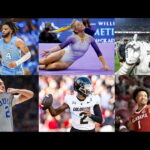For higher education marketers, the Olympics offer a golden opportunity to celebrate and promote student-athlete journeys, enriching the narratives of their institutions. As universities like the University of Minnesota and Northeastern University know, it’s about engaging audiences and shaping their university’s legacy through the power of storytelling.
The Olympics aren’t just for athletes. Universities turn gold moments into marketing magic.
More than a competition — the Games are a unique opportunity for universities to spotlight their stars by leveraging Olympic moments to create impactful marketing campaigns that highlight student success and boost the institution’s brand.

Leveraging Olympic Storytelling
When it comes to the Olympics, most define success in medals. We cheer the record times and photo finishes. A perfect vault. An elite dive. A game-winning goal.
The Olympics is so much more than that. For communicators, it is simply the greatest storytelling platform we have today.
It is the opportunity to build a narrative, tell a story and inform two important stakeholder audiences – alumni and the current student body. Most importantly, it is to celebrate past, present, and future success.
It is more than just a few posts on X. It is a calculated strategic plan set in motion months before the Olympic torch is lit. The plan? Highlight former, current, and in some cases, future student achievement.
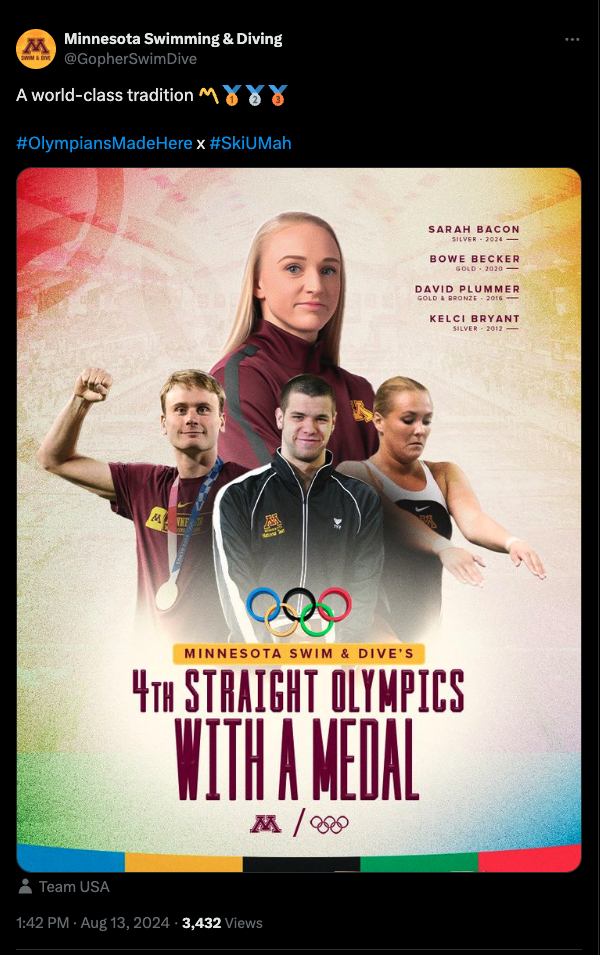
No matter the size of the institution, or the number of athletes participating, the excitement is palpable. And no matter who you speak to, the same word is often used to describe their plan: Opportunity.
“This is why I love my job,” says Mike Wierzbicki, senior associate athletics director at the University of Minnesota, who is promoting several athletics across multiple sports and countries. “There is no downtime. Traditionally, this time of the year, you are looking for future events to keep the student body informed. It is an opportunity to celebrate our athletes.”
Crafting Multi-Channel Campaigns for Engagement
Minnesota has a long reputation for producing high-profile athletes. Wierzbicki’s team knew before the Olympic trials that they would have athletes in the Olympics and set to work building a multi-tiered communications approach based on cross-channel promotion on social media.
What Wierzbicki never discussed was how the university would profit.
“It wasn’t formal, just looking for an opportunity to promote the students for who they are,” said Wierzbicki. “We wanted to celebrate their achievements first and foremost.”
Northeastern University Executive Editor in the Office of External Affairs Dave Nordman took a similar approach. Northeastern has three Olympians – including one Paralympian – and the comms strategy was more about the athlete’s journey through its Boston campus that led them to their Olympic success.
“For us, we wanted to share stories about the athlete’s journey and how Northeastern impacted their life,” said Nordman. “Every story we write is about how Northeastern shaped their experience.”
USA Rugby star Sarah Levy first tried Rugby when she landed at Northeastern by casually stopping by an activities fair. Ten years later, she was in the Olympics.
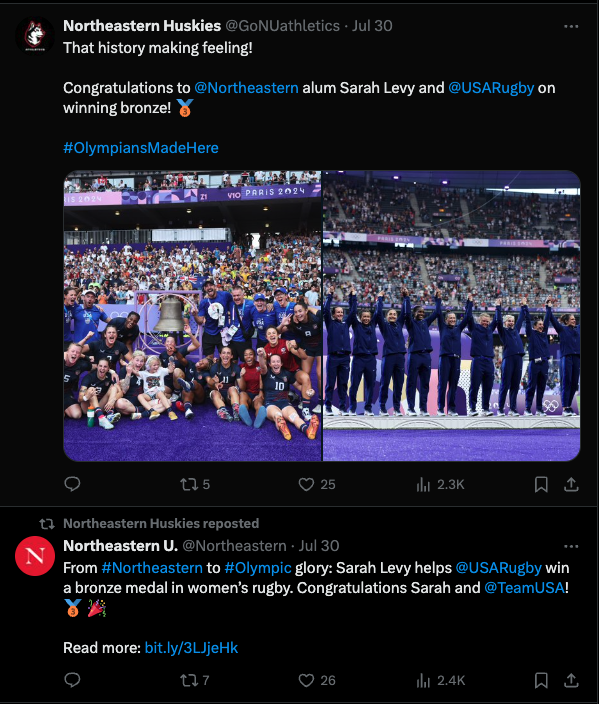
While Mahoney’s team used social media outlets like Instagram and X to promote each athlete, it was the Event Log on the university’s athletic site that garnered the most attention.
“It was something we started at the Olympic Trials,” said Mahoney. “We had immediate success [noticeable social engagement] and saw the interest from the students and faculty.”
Mahoney and his team constantly updated the log each evening with daily results and the next day’s schedule to show when University of Pennsylvania athletes would be participating.

Navigating Resource Constraints and Diverse Audiences
Northeastern had a multi-country and multi-platform communications approach. With 13 campuses spread out across the United States, Canada and Europe, Nordman ensured a cohesive social media and online magazine presence.
“There isn’t a day that goes by when I’m not talking to many of our campuses,” said Nordman. “Communication is constant to ensure we’re all aligned telling the same message and bringing it back to the Northeastern experience.”
Ironically, unlike Nordman and Wierzbicki, Mahoney had two unusual communications challenges. Not only did he have an incoming freshman, fencer Malak Hamza of Egypt, but he also had alumni, breakdancer Sunny Choi, who never played sports at Pennsylvania.
“How do you promote athletes with limited resources?” said Mahoney. He and the UPenn team turned to Olympians Made Here, a site that provides detailed information, backgrounds and a detailed toolkit, including Getty images of competition, to assist institutions in their athlete promotions.
“[Olympians Made Here is] really helpful for people around the country who are proactive about pointing out athletes and where they’re from,” said Mahoney.
The Impact of Olympic Storytelling on University Branding
All communications plans must have a return on investment. So, what does success look like when storytelling?
While all three acknowledged that university recruitment and ticket sales certainly can play a role, their goal was to celebrate the athletes.
“For us, it was about showing how Northeastern shaped their life experiences,” said Nordman who added that while recruitment was on the periphery of their communications outcome, it was more about telling the institution’s story.
Wierzbicki went further. “I think it helps generate interest [in other sports],” he said. “I would like to think we’d see more students at these non-conventional sporting events and perhaps generate more interest.”
While Northeastern and Pennsylvania have no definitive plans yet for marketing Paris Olympians and Paralympians, Minnesota has already planned an event for theirs.
“They’ll be celebrated at our first football game,” said Wierzbicki. “And then we’ll see what we might do later on.”
For each school, an increase in social media traffic and athlete attention took place during a normally quiet time on campus. The Olympics provided a springboard that lifted their institutions’ visibility, including notable Reels of the athletes thanking these institutions directly for their success.
“We wanted to reach a wider audience,” said Wierzbicki. “The more athletes you have in the Olympics, the wider the audience.”
In communications, you live for these moments. The opportunity to tell a story, shape the narrative and build positive visibility.
As communicators, we exhaustively search for stories that can shape future behavior and generate a positive outcome. It is the thrill of the hunt.
And when you land on a story that generates emotion like the Olympics can, the return on investment is often immeasurable. It is not always about engagement numbers. Nordman said his writers had received appreciative letters from Sarah Levy’s family, and those running the event log at the University of Pennsylvania have received similar kudos.
Other Olympic athletes, including American gymnasts Stephen Nedoroscik and Paul Juda, took to Instagram to thank their universities and coaches for their success.
Even though we are guided by numbers – financial, engagement or otherwise — sometimes, communications are just about doing the right thing. Maybe that deserves a medal.
Newsletter Sign up!
Stay current in digital strategy, brand amplification, design thinking and more.
Recent in Marketing & Branding
Also in Marketing & Branding

Higher ed marketing trends shaping an already high-stakes 2025.
From pluralism to branding battles, top voices in higher ed break down the marketing shifts you can’t afford to ignore.
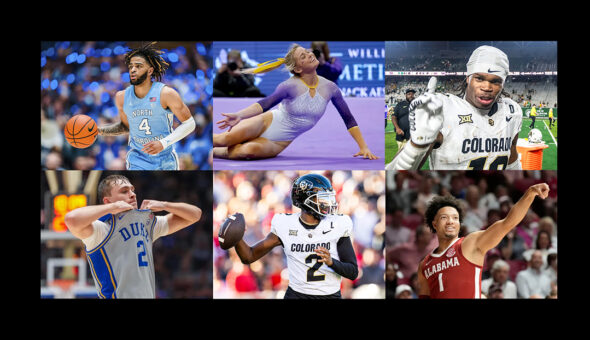
The NIL Top 10: Who are the highest-paid college athletes?
Growing collective contracts and sponsorship deals have university athletes — both men and women — raking in record paydays.
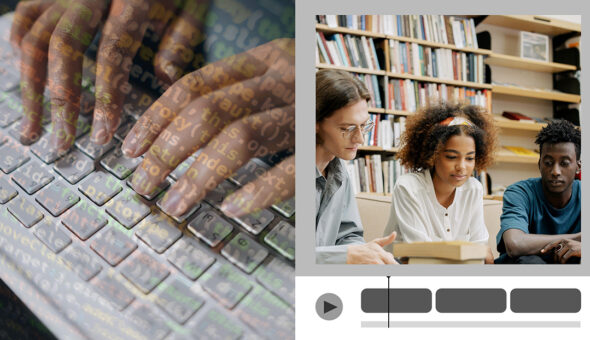
Can generative AI video be used in higher ed marketing?
Although not yet ready for prime time, generative AI video shows potential to transform recruitment, campus tours and storytelling—if humans lead the way.


